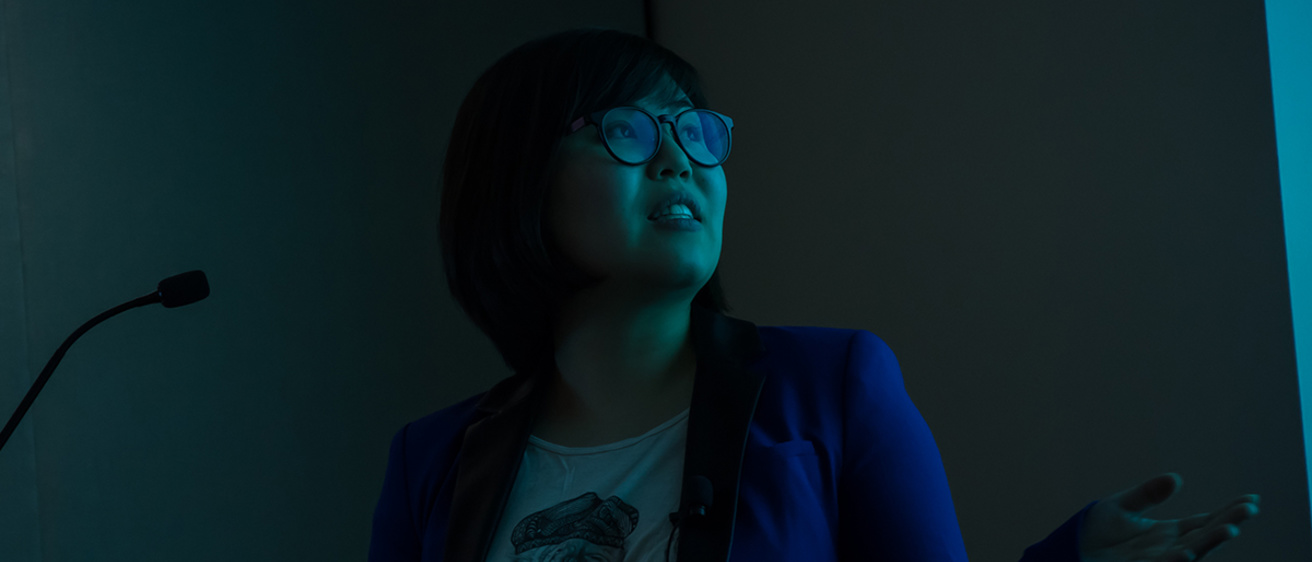Dental student Frankie Chyi didn’t need the official start of her dentistry education to begin conducting academic research. Eager to learn, she began interviewing parents about their children’s tooth-brushing habits the summer before she entered the University of Iowa College of Dentistry. And she did so on the advice of her older sister, who also is a UI dentistry student.
“It’s unusual to do research before you start school, but my sister really encouraged me to start early,” says Chyi, a second-year from Des Moines, Iowa. “She introduced me to her mentor and let me read her research. It was all about teeth whitening, and I didn’t understand any of it, but I took her advice.”
Chyi’s study, “Factors associated with toothpaste use among low-income families,” was one of more than 100 research papers presented at the 65th Annual Meeting of the Iowa Section of the American Association for Dental Research, held at the UI College of Dentistry and Dental Clinics on Feb. 13.
Chyi received the Max Smith Award, which recognizes the best oral presentation by a pre-doctoral dental student. The prize comes with a monetary award of up to $500.
“I’m so honored to have received the award,” says Chyi. “But I’m also really proud of the College of Dentistry for valuing research that can help the community. Research is important because it is the force behind everything we do as dentists. Dentists depend on sound research to improve dental care and make better clinical decisions.”
For her study, Chyi surveyed 212 parents at Women, Infants, and Children (WIC) food and nutrition centers in Iowa City and Des Moines to find out what they knew about oral health, as well as their children’s tooth-brushing habits. She found that about half of the parents did not know what fluoride was and that roughly half reported not having enough time to ensure their children brushed their teeth at least once a day.
“Even though many of the children had access to toothpaste and toothbrushes, they were still not brushing their teeth at least once a day,” Chyi says.
Chyi now must tackle the challenging next steps, including how best to educate low-income families about oral health.
And taking those steps is important. Conducting research helps students understand the science behind the dental procedures they will undertake one day in their own practices, says Teresa Marshall, professor of preventive and community dentistry and director of the Student Research Program, which was established at the UI College of Dentistry in 1984.
“Dentistry is both an art and a science,” Marshall says. “Doing research, as opposed to just reading science textbooks or journals, helps students appreciate the process of inquiry. Science is an evolution of collective thought, requires lots of effort, and doesn’t follow any expected trajectory. Participation in research also facilitates critical-thinking skills.”
The UI College of Dentistry has a strong national reputation for research, and faculty members encourage students to take on rigorous topics, Marshall says. A research course is offered in the fall as part of the school’s first-year curriculum, allowing many students discover a topic they want to pursue.
“During the course, faculty members present their research to the students, which helps students connect with a mentor and also learn about the great variety of research that is going on in the college,” Marshall says. “Of course, there are also students who just take a special interest in an area, and we work with them to match them with the right mentor.”
For Chyi’s part, she had to do some brainstorming to find a research topic that interested her, but once the future dentist had her idea, she was determined to see it through to fruition, says John Warren, Chyi’s research mentor and a professor of preventive and community dentistry. Chyi plans to continue her research and is already thinking about ways she can help low-income parents ensure good oral health for their children.
“Frankie developed her project from the ground up and had a hand in it from the beginning,” Warren says. “She has worked very hard on this research project. I’m proud of the work she’s doing and of the great example she sets for other dental students.”
